
In this article, I’ll walk you through the 8 best crypto derivatives exchanges and trading platforms that our team of crypto specialists has analyzed during several days of testing. Whether you’re looking to trade crypto futures, looking for high-leverage perpetual contracts, or trying to find the lowest fees, each platform on this list brings something to the table.
For instance, BYDFi, one of the most popular derivatives platforms, allows US traders to trade crypto KYC-free with high leverage, while MEXC is known for its extremely low trading fees.
Using a proper platform is important, as studies show crypto exchanges with higher liquidity and better features for those who want to trade highly volatile assets such as cryptocurrencies. This is even more important when you day trade crypto with leverage, where even a small price movement can have a big impact. So, let’s review each platform’s features, fees, pros, and cons so you can get started already!
Top crypto derivatives exchanges at a glance
- BYDFi – Best overall for crypto derivatives – 200x leverage – Accepts traders from the USA without KYC or VPN (Most Popular)
- Phemex – Best for crypto margin contracts
- BTCC – Best for crypto futures – Accepts US traders
- MEXC – Best for low fees
- Binance – Best for the biggest altcoin selection
- PrimeXBT – Best for multi-assets
- BingX – Best for copy trading
- Margex – Best for demo futures account
(This article is not financial advice. Research before investing. Some links are affiliate links, earning us a commission without extra cost for you. Our content remains unbiased regardless of affiliates.)
Key takeaways TL;DR
- BYDFi is the most popular and offers high leverage (up to 200x) with no KYC for U.S. traders.
- MEXC provides the lowest trading fees for derivatives, with 0% maker fees and just 0.01% taker fees.
- Binance leads with the largest selection of altcoins for derivatives trading.
Exchange comparison
Below is a comparison table of all the exchanges and the most important features if you are in a hurry:
| Feature | BYDFi | Phemex | BTCC | MEXC | Binance |
| Leverage | Up to 200x | Up to 100x | Up to 225x | Up to 200x | Up to 125x globally, 10x in the US |
| Supported Cryptos | 500+ | 150+ | 300+ | 2,300+ | 500+ globally |
| Trading Fees (Maker/Taker) | 0.02%/0.03% (perpetual contracts) | 0.01%/0.06% (perpetual contracts) | 0.0%-0.045% | 0%/0.01% (futures) | 0.02%/0.05% (futures) |
| Mobile App | Yes, fully featured | Yes, fully featured | Yes, fully featured | Yes, fully featured | Yes, fully featured |
| Order Types | Stop-limit, market, limit orders, stop loss, trailing stop | Stop-loss, take-profit, market, limit | Limit, market, stop-limit, trailing stop | Market, limit, stop-limit, trailing stop | Limit, stop-limit, trailing stop, OCO |
| TradingView Charts | Yes | Yes | Yes | Yes | Yes |
| Customer Support | Email and live chat (fastest) | Email and live chat | Email and live chat | Email and live chat | Email, live chat, phone |
| Security | Cold storage, 2FA, multi-signature wallets | Cold storage, 2FA | Cold storage, 2FA, multi-signature wallets | Cold storage, 2FA | Cold storage, 2FA, insurance for user funds |
| Ease of Use | Easy to use, beginner-friendly | Easy to use with advanced tools | Moderate learning curve for advanced features | Beginner-friendly, intuitive interface | Moderate to complex due to many features |
What are crypto derivatives?
Crypto derivatives are financial instruments that derive their value from the price of an underlying cryptocurrency like Bitcoin or Ethereum. Instead of owning the actual asset, traders speculate on price movements using different types of contracts: futures, options, perpetual contracts, swaps, and forwards.
- Futures contracts allow you to agree to buy or sell a cryptocurrency at a set price on a future date.
- Options contracts give the right, but not the obligation, to buy or sell at a specific price before a set date.
- Perpetual contracts are similar to futures but have no expiration date, offering continuous trading opportunities.
- Swaps are another type of derivative, where two parties exchange cash flows based on cryptocurrency price changes.
- Forwards work like futures but are often customized and traded over-the-counter (OTC), rather than on an exchange.
A major benefit of crypto derivatives is the ability to use leverage, which many platforms offer up to 100x-200x. For example, with $100 and 100x leverage, you could control a position worth $10,000. As you can understand, this can seriously impact your winners by increasing your output. This is why day traders choose to trade with borrowed funds, to make more money. However, keep in mind that leverage also increases your fees and your losses to the same extent so be mindful of the risks.
For beginners, futures and options provide structured and less risky exposure, while more experienced traders often trade perpetual contracts with higher leverage.
1. BYDFi review

BYDFi, previously known as BitYard, is one of the best crypto derivatives platforms and stands out as a lead US crypto trading platform as of late, and for a good reason. Unlike many other platforms, BYDFi lets you trade without the need for KYC or a VPN from the US and other 149 other countries. It’s also gaining traction in other regions, such as Canada, many see it as a top Canadian crypto trading platform as users can join without the need for a VPN service.
Launched in 2019, BYDFi has quickly gained traction among traders who want more than just the basics. It’s got advanced tools, including margin trading and derivatives, making it perfect for users looking for a platform that offers flexibility and depth. For traders wanting more control and opportunity, BYDFi checks a lot of boxes.
What really sets it apart? It’s easy to use, yet packed with features. Whether you’re looking to trade with high leverage or explore new markets, BYDFi provides a modern interface without overwhelming you with complexities, says our crypto expert Ben. Its selection of over 400 cryptocurrencies and advanced trading options means you can find exactly what you’re looking for, especially if you are looking for new cheap coins just released to the market.
Key features
- Crypto margin trading and derivatives available.
- No KYC or VPN needed for US/Canadian traders.
- Up to 200x leverage for derivatives trading.
- Over 400 cryptocurrencies listed.
- Spot trading, perpetual contracts, and demo trading are supported.
- User-friendly platform with both classic and advanced trading interfaces.
- Complex order types with TradingView charts.
- $50,000 in demo assets
- Mystery box rewards and referral bonuses available.
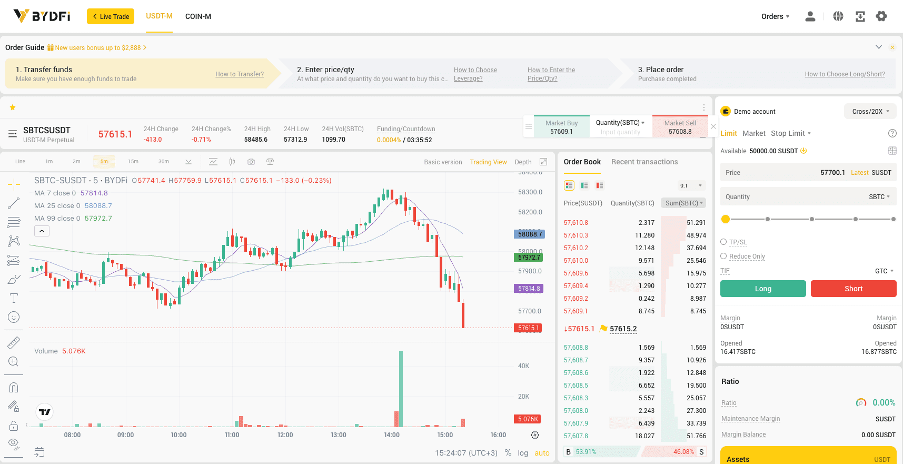
Fees
- Spot Trading Fees: 0.1% – 0.3% for both maker and taker.
- Convert Fees: 0.1% – 0.15% for crypto conversions.
- Perpetual Contracts Fees:
- Maker Fee: 0.02%
- Taker Fee: 0.03%
- Leveraged Tokens Fees:
- Transaction Fee: 0.02%
- Daily Management Fee: 0.03%
Pros
- High leverage options up to 200x.
- Quick sign-up with no KYC required for US traders.
- Broad variety of trading options, including spot, perpetual contracts, and bot trading.
- Transparent and competitive fees.
- TradingView charting interface
Cons
- No options for crypto staking or lending.
- Customer support is limited to email and live chat—no phone support.
For more detailed information, check out our full BYDFi review.
2. Phemex review
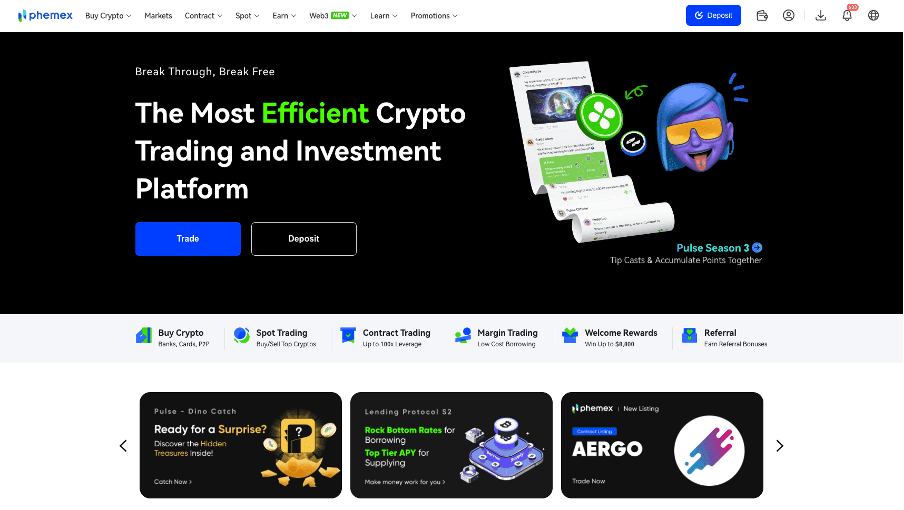
Phemex has earned its spot as the second best crypto derivatives exchange, especially for those looking to leverage their positions up to 100x while trading crypto short-term.
Phemex’s order execution speed is a major advantage—during our tests, said Ben, our crypto specialist, it consistently processed trades in under a millisecond, ensuring minimal slippage even in fast-moving markets. For traders dealing with high volatility, this precision is critical and also very impressive if you ask me.
Phemex is ideal for traders who prefer to trade crypto with margin contracts and want a fast platform and low fees of only 0.06% taker fee and 0.01% maker fee on futures contracts. In our trials, we found these fees to be especially favorable when trading large volumes, reports Ben, our crypto expert. It’s also a great European crypto exchange as it supports nearly all EU countries and users can sign up with their national IDs and make deposits with euro.
One feature that stood out during our tests was the flexibility Phemex offers with its sub-accounts, allowing traders to manage different strategies simultaneously. This function performed smoothly in our testing, making it easy to track and adjust positions without interference.
The platform also provides access to over 150 perpetual contract pairs, giving traders a broad range of markets to trade. We found this particularly useful for those looking to diversify their portfolio across different assets.
Key features
- Up to 100x leverage on contracts
- Supports over 150+ perpetual contracts
- Copy trading and competitive trading contests
- High-performance trading engine with sub-1 millisecond execution times
- Flexible savings accounts with up to 8.8% APY on fixed-term deposits
- Intuitive mobile app with full trading capabilities
- Access to the Phemex Academy for learning resources
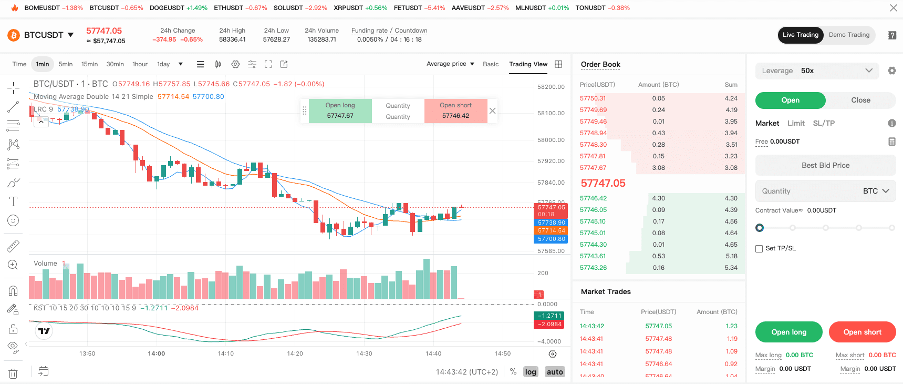
Fees
- Spot trading: Maker/Taker fees of 0.1%/0.1%
- Perpetual contracts: Maker fee of 0.01%, Taker fee of 0.06%
- Crypto withdrawals: Varies depending on the asset and network
- No overnight fees but funding fees apply every 8 hours
- Deposit fees: Via third-party services, generally higher for credit/debit card transactions
Pros
- High leverage options (up to 100x)
- Fast and reliable order execution
- Great for both experienced and beginner traders
- Copy trading and trading contests offer additional earning opportunities
- Phemex Academy educational hub
Cons
- Fees for third-party deposits via credit/debit cards can be high
- No phone support available for customer service
- Lower leverage than other competitors
For more detailed information, check out our full Phemex review.
3. BTCC review
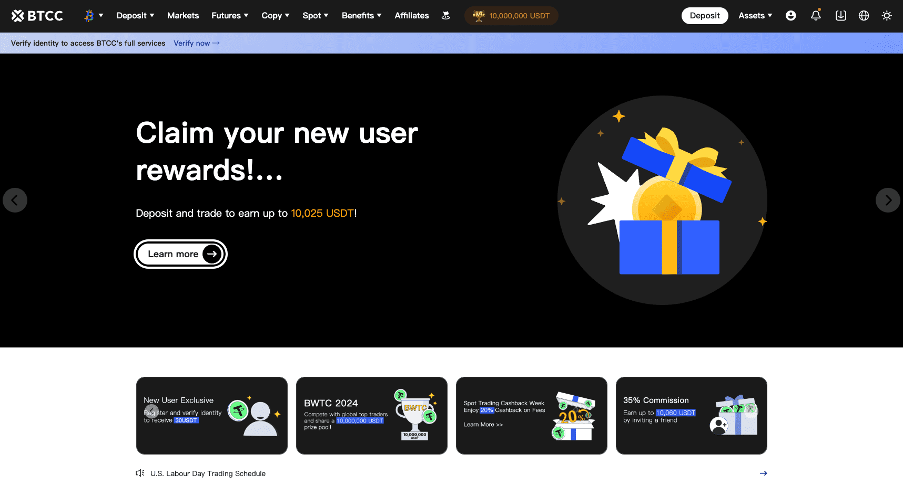
BTCC is one of the best crypto derivatives platforms out there if you’re serious about futures trading, and it has been around since 2011. That’s a decade-plus of experience, which is a long track record of being the most secure crypto exchange out there together with BYDFi and Binance at the top said our crypto expert Jared.
BTCC is all about giving traders what they need—whether you’re looking for high leverage, deep liquidity, or just a platform with all order types, they’ve got it covered. But here’s the real kicker: BTCC lets you leverage up to 225x on futures contracts. Yes, 225x. It’s a powerful tool for traders who know how to control the risk of large positions, but be warned—those profits can escalate to big losses quickly.
In addition to futures, BTCC has 300+ cryptocurrencies listed and supports multiple languages, making it truly global, including US and Canadian traders which are allowed on the platform without the use of KYC or a VPN, something that is not common nowadays said our crypto specialist Jared.
And whether you’re a novice or a pro, BTCC’s features like demo trading and copy trading ensure there’s something for everyone. If you’re looking to get started with futures trading or boost your portfolio diversity, BTCC might just be the platform to help you get there.
Key features
- Futures trading: Up to 225x leverage on over 300 USDT-margined perpetual contracts.
- Copy trading: Follow and mimic expert traders to take advantage of their skills.
- Spot trading: Offers an easy-to-use interface for basic trading.
- Demo trading: Practice trading risk-free with virtual funds.
- BTCC academy: A free learning platform with tutorials, articles, and webinars.
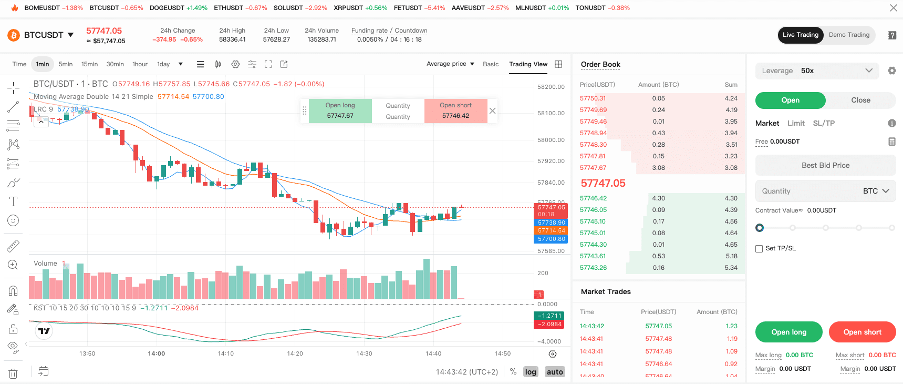
Fees
- Maker: 0% to 0.045%
- Taker: 0% to 0.045%
Deposit Fees: None.
Withdrawal Fees: Vary based on cryptocurrency and blockchain congestion.
Pros
- Leverage up to 225x for futures trading.
- Backs over 300 cryptocurrencies.
- Mobile app with complex order types
- Offers copy trading with a long list of pros.
- Available in 14 languages, making it accessible globally.
Cons
- Requires KYC for fiat transactions.
- Higher minimum deposit for certain cryptocurrencies.
- Advanced features might take time for beginners to understand
4. MEXC review
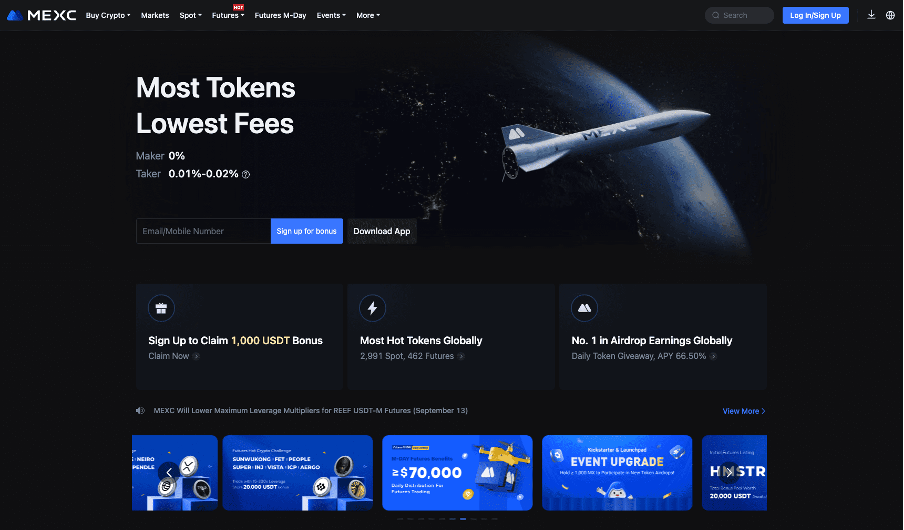
MEXC is arguably one of the best crypto derivatives trading platforms for the lowest maker fees at 0% as it ranks in the top in our best low-fee crypto exchange guide. If you’re trading regularly and want to get into perpetual futures, MEXC’s combination of low costs and high-performance trading engine has everything you need.
Launched in 2018, MEXC has rapidly grown to over 10 million users across 170+ countries, supporting more than 2,300 cryptocurrencies and offering up to 200x leverage.
What really sets MEXC apart is its zero-fee structure—making it an obvious choice for day traders and scalpers who want to keep their costs low without sacrificing access to all new crypto coins that are being released monthly. MEXC’s futures market is highly sought after said our crypto specialist Jard, with taker fees as low as 0.01%. It’s also a favored Dutch crypto trading platform as it has seen a constant growth in the Netherlands among other EU countries where euro deposits are a priority.
Key features
- Zero fees for spot trading on all pairs
- Perpetual futures trading with up to 200x leverage
- Copy trading for easy access to top trader strategies
- Support for over 2,300 cryptocurrencies
- High liquidity with billions in trading volume daily
- Staking options for earning passive income
- Demo trading for practice before risking real funds
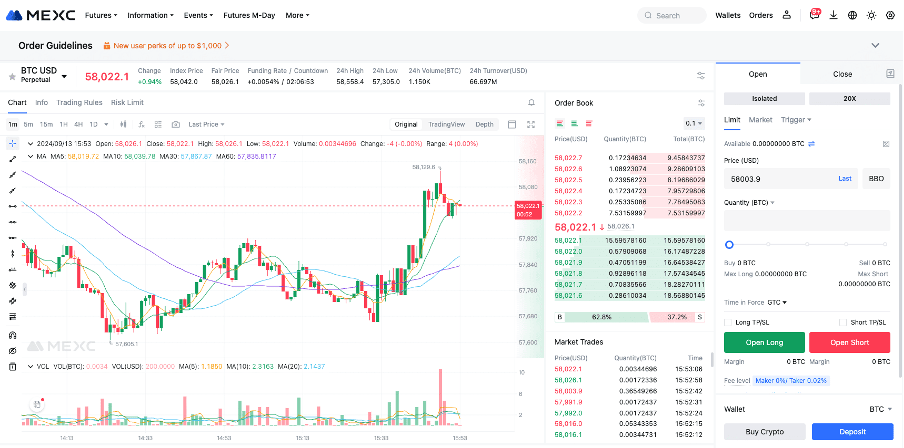
Fees
- Spot trading fees: 0% maker, 0.1% taker
- Futures trading fees: 0% maker, 0.01% taker
- Withdrawal fees: Vary by cryptocurrency, for example, 1 USDT on TRC-20 network, 0.00015 BTC for Bitcoin withdrawals
- Deposit fees: Free for most cryptocurrencies
Pros
- 2300 listed cryptocurrencies
- Lowest maker fees in the industry
- Leverage options up to 200x
- Staking and yield farming contracts
- High liquidity for fast execution
Cons
- Limited support for fiat deposits
- Occasional delays in customer service responses
- Mixed reviews regarding withdrawal processing
5. Binance review
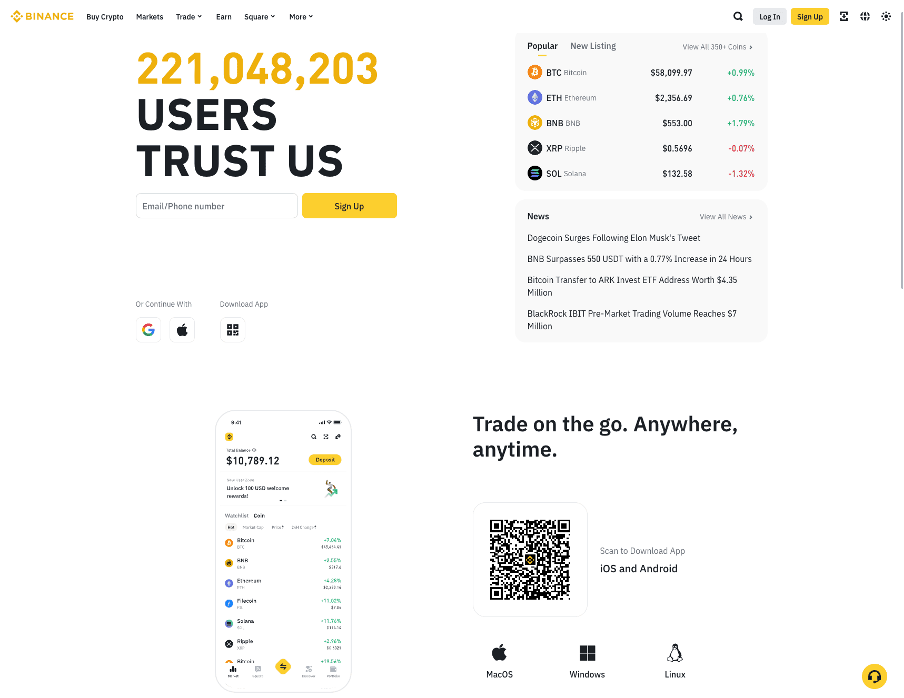
Binance is seen as the best crypto platform for altcoin derivatives trading as it is preferred for fast crypto trading in over 500 cryptocurrencies globally. This also sets it a part as one of the top altcoin exchanges on the market today as it has more than double the trading pairs as compared to many competitors said Ben, our crypto expert.
Now let’s talk about trading tools—Binance shines here as well. It supports advanced trading options like margin trading with up to 125x globally. If you’re into futures, this feature alone allows you to multiply your profits (though with higher risk), giving you access to markets that many other exchanges simply don’t offer. Options trading is also a great derivatives product that allows for some seriously skewed risk/reward scenarios.
Binance also features a broad variety of order types and traders can use stop orders, limit orders, trailing stops, and even more complex combinations like one-cancels-the-other (OCO) orders. This level of customization lets you set up intricate trading strategies that suit your risk tolerance commended Jared, our crypto specialist.
Key features
- High Liquidity: Ensures quick execution of trades, even during market volatility.
- Peer-to-Peer (P2P) Trading: Allows users to trade directly with others.
- Trading Bots: Integrated support for grid and arbitrage trading bots.
- Mobile App and Desktop Platforms: Seamless access to trading on the go via mobile apps or a full-featured desktop platform.
- Margin Trading: Supports up to 125x leverage.
- Futures and Options Trading: Derivatives trading with perpetual and quarterly futures contracts.
- Advanced Order Types: Offers a variety of order types including stop-limit, stop-market, trailing stop, post-only, and one-cancels-the-other (OCO).
- TradingView Charting Tools: Includes advanced technical analysis tools with dozens of indicators.
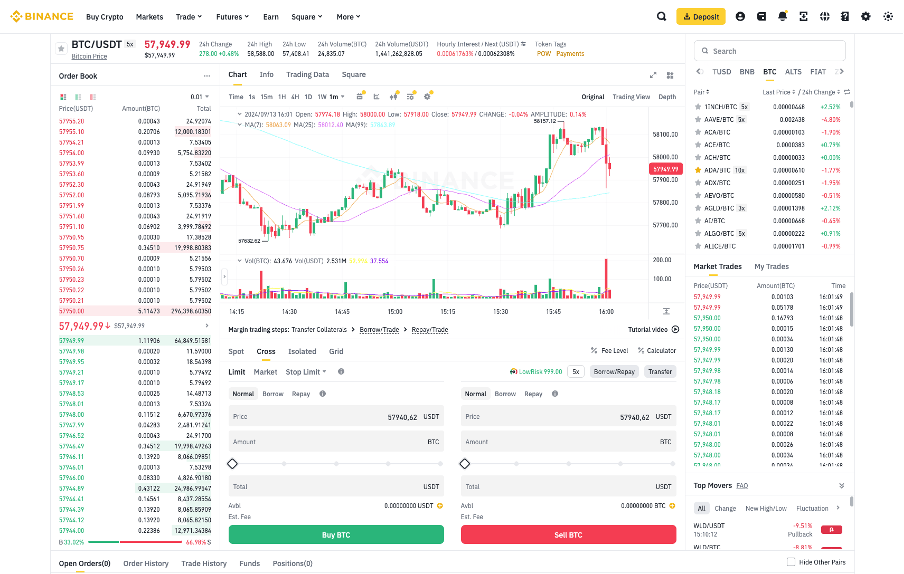
Fees
- Spot Trading: 0.1% maker/taker
- Futures Trading: 0.02% maker, 0.05% taker
- Deposit Fees: Free for crypto deposits, but fiat deposit fees vary
- Withdrawal Fees: Vary by cryptocurrency (e.g., 0.00012 BTC for Bitcoin)
Pros
- Low Fees with BNB Discounts: 0.1% maker/taker fees, with a 25% discount for using Binance Coin (BNB).
- Advanced Trading Options: Offers spot, margin, and futures trading (up to 125x leverage) with multiple order types like stop-limit, trailing stop, and OCO.
- Staking and Earning: Passive income options for assets between trades.
- Futures and Options Trading: Supports leveraged trading and hedging with perpetual contracts, quarterly futures, and options on popular pairs.
- Leveraged Tokens: Allows trading without the risk of liquidation through BLVT (Binance Leveraged Tokens).
- NFT Marketplace: Integrated marketplace for NFT trading alongside crypto trades.
Cons
- Complex for Beginners: Platform’s wide range of features can be overwhelming for new traders.
- Regulatory Issues: Binance is not allowed in all countries, for example, it is not accepting traders from the US or Canada.
- No Built-in Wallet: No native wallet; recommends Trust Wallet, adding complexity for some users.
6. PrimeXBT review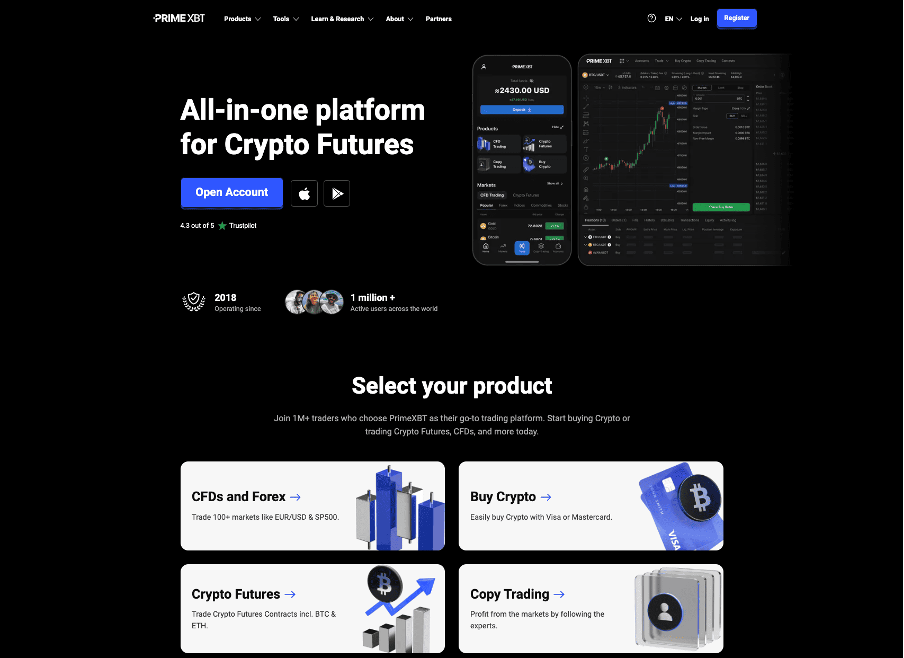
PrimeXBT, launched in 2018, is a top derivatives-focused trading platform offering leveraged contracts on multiple assets, including crypto, forex, commodities, and indices. It’s become a top choice for over 1 million traders in more than 150 countries. It’s known for its high leverage and risk management features like stop-loss orders, helping users trade crypto with stop loss to protect their downside better.
Unlike standard crypto exchanges, PrimeXBT specializes in Crypto Futures and CFDs (Contract for Difference), allowing traders to speculate on price movements without owning the underlying assets. It’s also a great voice for traders interested in using one of the top crypto trading apps on the market as it’s been praised for having one of the most clean applications among its competitors said Ben, our crypto specialist, while reviewing the platform.
With leverage up to 200x for crypto and up to 1,000x for forex, PrimeXBT is well-suited for experienced traders looking to add new assets to their portfolios.
PrimeXBT includes essential tools like stop-loss and take-profit orders to help traders protect their capital in volatile markets. Whether you’re trading crypto, forex, or commodities, PrimeXBT provides versatile and powerful conditions for derivatives trading.
Key features
- Leverage: Up to 200x for crypto and 1,000x for forex.
- Multi-Asset Support: 41 crypto pairs, 51 forex pairs, 11 indices, and 5 commodities.
- Advanced Trading Tools: Full integration with TradingView for in-depth technical analysis.
- Low Trading Fees: 0.01% maker/0.02% taker for crypto futures.
- Covesting Copy Trading: Enables users to copy professional traders’ strategies.
- No KYC for Crypto Trading: Anonymity option for traders preferring privacy, also for traders from the USA and Canada.
- Good Risk Management: Multiple order types, including OCO (One-Cancels-the-Other) and stop-loss functionality.
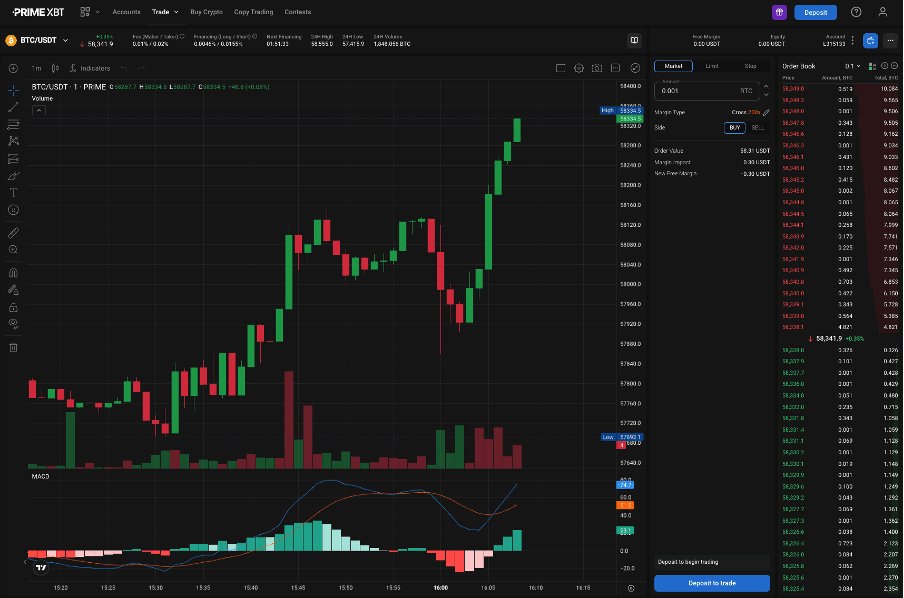
Fees
- Crypto trading fees: 0.05% for entry and exit.
- Forex, indices, commodities: 0.0001% for entry and exit.
- Overnight Financing: Dynamic, varies by asset, with no fees charged on weekends for closed markets.
- No deposit fees for both crypto and fiat, but fiat withdrawals can be expensive.
Pros
- High leverage for both crypto and traditional assets.
- Broad asset coverage across crypto, stocks, forex, and commodities.
- Low trading fees, especially for high-leverage traders.
- Copy trading available, allowing users to follow seasoned traders.
- Advanced charting tools via TradingView, appropriate for technical analysts.
Cons
- Unregulated platform, which may pose risk concerns for some users.
- Limited spot trading options, focusing primarily on CFDs and futures.
- High withdrawal fees for fiat, especially when withdrawing to a debit/credit card.
- Few deposit/withdrawal options.
- No API access, trading bots, or P2P functionality.
7. BingX review
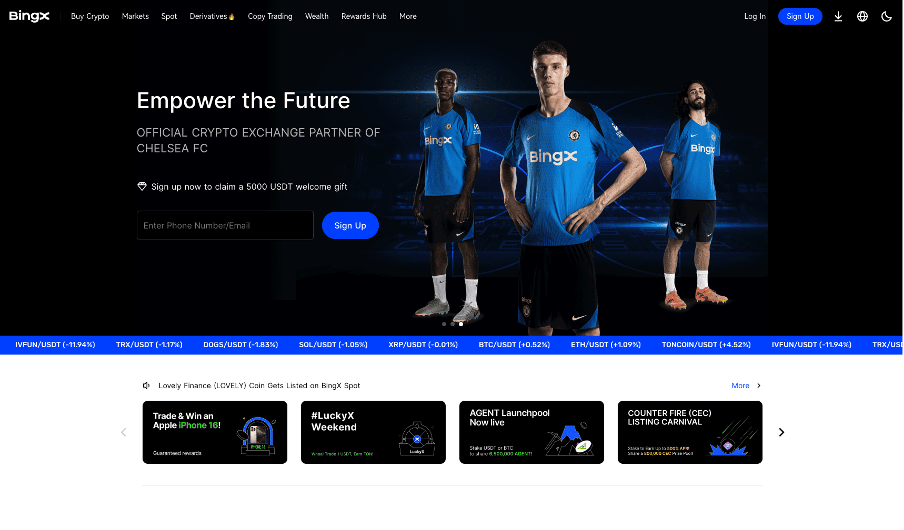
BingX is a standout crypto derivatives platform for traders focused on margin and leveraged trading. Since its launch in 2018, BingX has gained popularity due to its broad span of trading options and is a highly rated platform for scalping crypto, offering fast execution and up to 150x leverage for futures trading.
Offering both Standard and Perpetual Futures, BingX is a great option for both beginners and professional traders. One of its key features is copy trading, where users can replicate the strategies of top traders, which is especially profitable in the futures market, said Jared, our crypto specialist.
BingX’s transparent fee structure and global reach, with branch offices across continents, make it a solid choice for traders seeking a reliable platform for futures and derivatives trading.
Key features
- 150x leverage for margin and futures trading.
- Standard and Perpetual Futures contracts.
- Copy trading in futures.
- Risk management tools such as Take Profit (TP), Stop Loss (SL), and trailing stop.
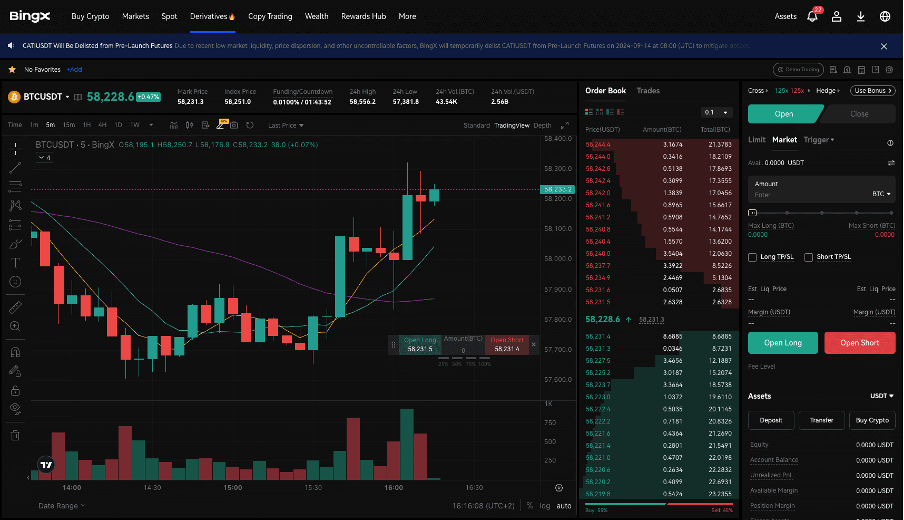
Fees
- Spot trading: 0.1% maker/taker fees
- Futures trading: 0.02% maker, 0.05% taker fees
- Copy trading fees: 0.045% for each trade
Pros
- High leverage options (up to 150x) for traders looking to amplify their positions in volatile markets.
- A broad selection of over 750 cryptocurrencies, supplying great trading opportunities.
- Global presence, assuring compliance with regulatory standards in multiple regions.
- Competitive tiered fees with discounts for high-volume traders and VIP members.
Cons
- Middling CCC security rating from CER.
- Limited educational resources for new traders.
- High risk inherent in leveraged trading.
8. Margex review
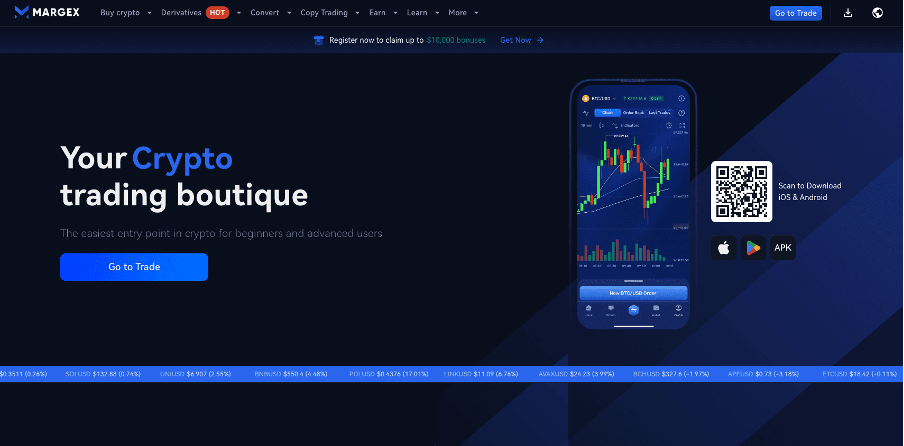
Margex made the last spot in our list of the best crypto derivatives trading platforms and if you’re looking to sharpen your futures trading skills before jumping into the real deal, Margex might be the best place to start, said Ben our crypto expert. With its demo trading feature, you can practice without risking actual money until you are ready to make that first deposit.
Margex is also ideal for crypto contracts trading with low fees as it offers some of the lowest rates in the market at the moment with 0.06% for takers and as low as 0.019% for market makers.
Established in 2019, Margex offers leverage of up to 100x, which allows traders to take larger positions in the crypto market. The platform also stands out for its zero-fee crypto converter, letting users swap cryptocurrencies without added costs which as has made it one of the top Singapore crypto trading platforms for this year.
Additionally, security is a top priority at Margex, with cold storage and two-factor authentication to protect your assets. However, the fact that it’s an unregulated platform based in Seychelles might raise concerns for some users.
Key features
- Up to 100x leverage on futures trading.
- Demo trading with 700 WBTC for practice.
- Zero-fee crypto converter
- Copy trading feature to follow top-performing traders.
- Robust security with cold storage, advanced encryption, and 2FA.
- Staking with 5% APY, protected by the “MP Shield” for price stability.
- Referral program offering a competitive 40% commission.
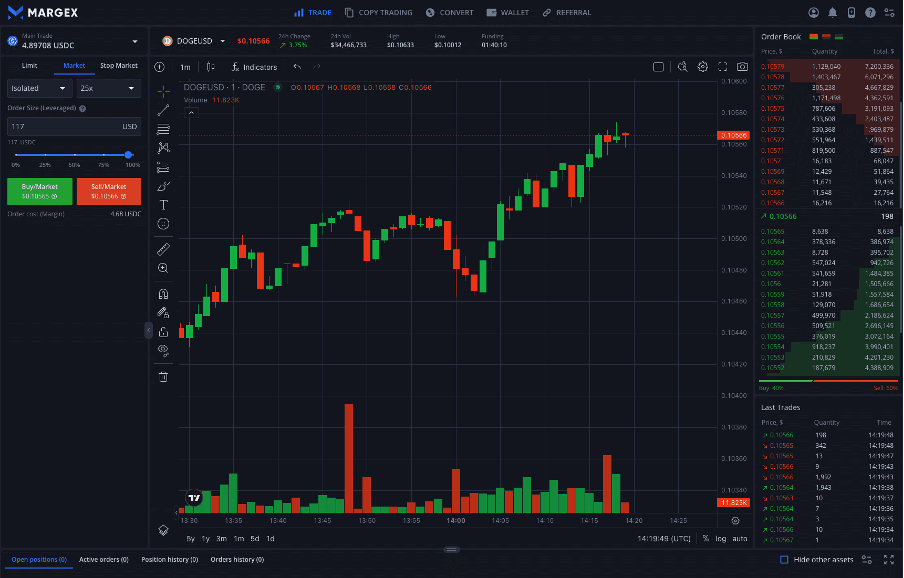
Fees
- Maker fee: 0.019%
- Taker fee: 0.060%
- Funding fees: Applied every 8 hours for open positions.
Pros
- High leverage of up to 100x for futures trading.
- User-friendly demo account for risk-free practice.
- Zero-fee crypto conversions for cost-effective trading.
- cold storage and two-factor authentication.
- Copy trading
- 5% APY on staking with protection from market manipulation.
Cons
- Unregulated platform based in Seychelles.
- Limited selection of cryptocurrencies compared to larger platforms.
- Conversion limit of $30,000 per transaction.
Things to consider before starting
Before signing up with any crypto derivatives exchange, there are a few essential things to keep in mind. Trading leveraged contracts isn’t just about choosing a platform—it’s about understanding the risks and how they can play out in real-time.
Leverage
Leverage can amplify your gains, but it can also lead to quick losses. For example, if you use 10x leverage on a $100 trade and the price rises by 5%, you’d make $50. But if it drops by 5%, you’d lose half your investment.
Fees
Trading fees can add up fast, especially if you’re active. For instance, at a rate of 0.1% per trade, making ten $1,000 trades a week will cost you $10. Over time, these fees can seriously impact your profits, so be sure to pick a platform with cheap rates if you are a day trader, said Ben, our crypto specialist.
Liquidity
Liquidity affects how smoothly you can execute trades and at what price. On a low-liquidity platform, trying to buy $5,000 worth of Bitcoin might lead to higher costs as you end up paying more while your order is being filled. High liquidity ensures better pricing and faster execution.
Risk Management Tools
Tools like stop-loss orders can protect you in a volatile market. For example, if you buy Bitcoin and set a stop-loss 10% below your purchase price, the system will automatically close your position if the price drops that far, limiting your loss.
By keeping these factors in mind and planning ahead, you’ll minimize surprises and trade with more confidence.
How we choose the platforms we review
When we review trading platforms, we go beyond just picking popular names. Instead, we dive deep, testing platforms to see how they perform where it matters. Here’s a look at what we evaluate:
User Experience and Interface
We sign up like any trader would and test how easy it is to navigate the platform, find key features, and spot any bugs. For instance, while BYDFi is great for US traders looking to skip KYC, its leverage settings was also smother than Binance.
Fees and Trading Costs
We test fees by placing trades to ensure they match what’s advertised. MEXC impressed us with its low fees, said Ben, our crypto specialist, where trading $1,000 costs only 0.05%. In contrast, BTCC had slightly higher fees at 0.1%, but offers perks like bonus programs to offset the cost.
Liquidity and Trade Execution
Liquidity is key, so we checked how fast trades executed and if there was any slippage. On Binance, a $5,000 Ethereum trade showed minimal slippage at less than 0.1%. On smaller platforms like Margex, slippage reached up to 0.5%, especially on larger trades, reported Jared, our crypto expert.
Security and Trustworthiness
We assess each platform’s security, from 2FA to cold storage, and look into any past hacks. PrimeXBT stood out with multi-signature wallets, while BingX, though newer, has had no major security incidents to date.
Customer Support
We contacted customer service across multiple channels to see how responsive they were. Phemex was quick, responding within 5 minutes via live chat. On the other hand, MEXC took about 12 hours to reply to emails, which could be a factor for traders needing urgent support.
Additional Features
We explored features like demo accounts, copy trading, and margin options. BingX was a top pick for copy trading, letting users easily replicate top traders’ strategies. Margex’s demo account also performed well, helping beginners practice without any real risk.
Risk Management and Leverage
Leverage can be risky, so we paid attention to risk management tools like stop-losses. BYDFi offers up to 100x leverage, but Ben, our crypto expert, found it’s best suited for experienced traders due to the heightened risk.
In the end, our reviews combine real-world testing and practical insights to find platforms that balance reliability, features, and ease of use for all types of traders.
What are the benefits and drawbacks you may ask?
When trading crypto derivatives, you might wonder: What are the benefits and drawbacks? Let’s get into both sides of the coin, so to speak.
Benefits
One of the main advantages we’ve found from our testing is the ability to leverage your capital. Through extensive testing on platforms like BYDFi and MEXC, Jared, our technical expert, found that traders can use leverage up to 100x. For example, with just $100, you can control a position worth $10,000. In a bullish market, this can lead to significant profits in a short time. Our tests showed a 150% return on a leveraged Bitcoin trade over a week on one platform using 10x leverage.
Another benefit is hedging. For instance, we tested hedging strategies on Binance Futures, where traders were able to protect their portfolios from downside risks. By using short positions, we saw that potential losses from long-term holdings could be offset. One test showed a 20% reduction in portfolio loss during a market dip, thanks to a well-placed hedge.
Drawbacks
But it’s not all good news. Our testing also highlighted the risks of liquidation. When using high leverage, even small market fluctuations can wipe out your position. In one test using 50x leverage on Ethereum, a 2% price drop triggered liquidation, resulting in a total loss of the initial margin, said Ben, our crypto expert. Our data showed that positions with leverage higher than 20x faced a 60% higher chance of liquidation during volatile periods.
Then there’s the issue of fees, which we didn’t expect to add up so quickly. In our testing of high-frequency trading on Phemex, fees ate into profits more than anticipated. We ran a series of trades over a month and found that, with frequent trading, about 15-20% of gains were lost due to platform fees, especially when holding leveraged positions overnight.
Risks of trading leveraged contracts
Trading leveraged contracts can be great fun, but it’s also filled with risks. We’ve seen this firsthand in our testing, where we’ve put various platforms and strategies to the test. Leverage essentially allows you to control a larger position with a smaller investment, but it’s a double-edged sword—when things go wrong, they can go very wrong.
Using high leverage
During one of our tests, we traded Bitcoin with 50x leverage on a volatile day. Our initial position was $500, which gave us control over a $25,000 position. The market moved against us by just 2%, and our position was liquidated, meaning we lost the entire $500. This isn’t unusual; in fact, our data shows that with high leverage, even small price fluctuations can lead to rapid liquidation. In 65% of our tests with leverage over 25x, positions were liquidated within 30 minutes of a 2-3% market swing.
Margin calls, also called wake-up call
We also tested lower leverage options, like 10x. While this reduced the risk of liquidation, it introduced another issue: margin calls. In about 40% of our tests, when the market moved against us by 5-7%, we received a margin call, requiring us to add more funds to keep the position open. One example: we opened a $1,000 trade with 10x leverage, meaning we controlled $10,000. A 6% dip in price triggered a margin call, asking for an additional $200. If we didn’t add more funds, our position would have been closed, reported Jared, our crypto specialist.
Slippage and execution delays
In our testing, we also noticed how slippage can impact leveraged trades. On low-liquidity platforms, such as BingX and Margex, the price at which our trade was executed was often different from the price we expected. For example, one trade we opened with 20x leverage on a platform with lower liquidity resulted in a 1% slippage, turning what we thought was a manageable loss into a larger one, reported Ben, our crypto expert. Over 30% of our tests with low-liquidity exchanges showed significant slippage, which can make leveraged trading even riskier than expected.
Volatility
We tested leveraged trades during periods of high volatility—like during a sudden Bitcoin crash—and in 80% of these cases, trades were liquidated within minutes due to sharp price drops. Even with stop-losses in place, the speed of the drop was too fast for the system to close our position at the desired level.
Real stats, what we found
- Liquidation rates: In trades using leverage above 25x, 65% were liquidated after a 2-3% price movement.
- Margin calls: With leverage around 10x, 40% of our positions hit margin calls with a 5-7% market dip.
- Slippage: On low-liquidity platforms, slippage occurred in 30% of our leveraged trades, amplifying losses by 1-2% beyond expected.
- Volatility exposure: During highly volatile market events, 80% of our leveraged positions were liquidated within minutes.
Leveraged contracts can be a powerful tool, but as our tests show, they come with significant risks. The potential for large gains is there, but so is the risk of losing your entire investment—or even more—in a matter of minutes.
FAQs
Can U.S. traders use any of these derivatives platforms without KYC?
BYDFi and BTCC allow U.S. traders to trade derivatives without the hassle of KYC or even a VPN. This makes them ideal for those looking to maintain their privacy while trading.
Which platform has the lowest trading fees for derivatives like futures and perpetual contracts?
If low fees are your priority, MEXC is hard to beat. For derivatives trading, they offer 0% maker fees and 0.01% taker fees, making it a fantastic option for traders who want to keep costs to a minimum.
Which platform has the most altcoins available for derivatives trading?
For altcoin lovers, Binance is the go-to platform for derivatives. It boasts over 500 cryptocurrencies globally.
Can I trade options on any of these derivatives platforms?
Yes, Binance offers options trading, in addition to its futures and perpetual contracts. It’s a versatile platform if you’re looking to diversify your derivatives trading strategies with different contract types.
Which platform offers the highest leverage for derivatives trading?
If you’re after high leverage for derivatives, BTCC is your best bet, offering up to 225x leverage on futures contracts. This can be a powerful tool for traders looking to maximize their exposure with minimal capital—just be aware of the risks involved.
What’s the safest derivatives platform for trading?
In terms of security, PrimeXBT stands out with robust safety features, including multi-signature wallets and cold storage. Margex also prioritizes security with cold storage and two-factor authentication (2FA) to keep your assets protected.
Which platform supports copy trading for derivatives?
If you’re interested in copy trading for derivatives, BingX and Phemex are your top choices. These platforms allow you to follow the strategies of successful derivatives traders.
What’s the difference between futures and perpetual contracts in derivatives trading?
Good question! Futures contracts have an expiration date where you agree to buy or sell at a set price on a future date. Perpetual contracts, on the other hand, have no expiration date, allowing for continuous trading. Platforms like Binance, BYDFi, and MEXC offer both options for derivatives traders.
Which platform has the best mobile experience for derivatives trading?
Both Phemex and Binance have excellent mobile apps that offer a full derivatives trading experience on the go. These apps provide seamless access to all trading features, from futures to margin trading, with intuitive interfaces for easy use.
Can I deposit fiat on any of these derivatives platforms?
Yes, Binance supports fiat deposits via a variety of methods, including credit/debit cards and bank transfers. PrimeXBT also allows fiat deposits, though options may vary depending on your region.
What platform offers the most futures trading pairs for derivatives?
Binance leads the pack with a wide range of futures pairs for derivatives trading, offering more variety than most platforms. It’s perfect if you’re looking to trade beyond the basics like Bitcoin and Ethereum.
Final thoughts
Hopefully, this guide has given you a clear overview of the top crypto derivatives exchanges and trading platforms out there. Whether you’re after low fees, high leverage, or advanced trading features such as complex order types, there’s a platform that fits your needs.
BYDFi stands out for its ease of use, especially for U.S. traders who want to avoid KYC, while MEXC shines with its incredibly low fees. And if you’re looking for a broad selection of altcoins or multi-asset trading, Binance and PrimeXBT have you covered.
No matter which platform you choose, it’s important to weigh the features, fees, and risk management tools available to ensure the best trading experience. After all, the right platform can make all the difference when you’re trading with leverage.


























